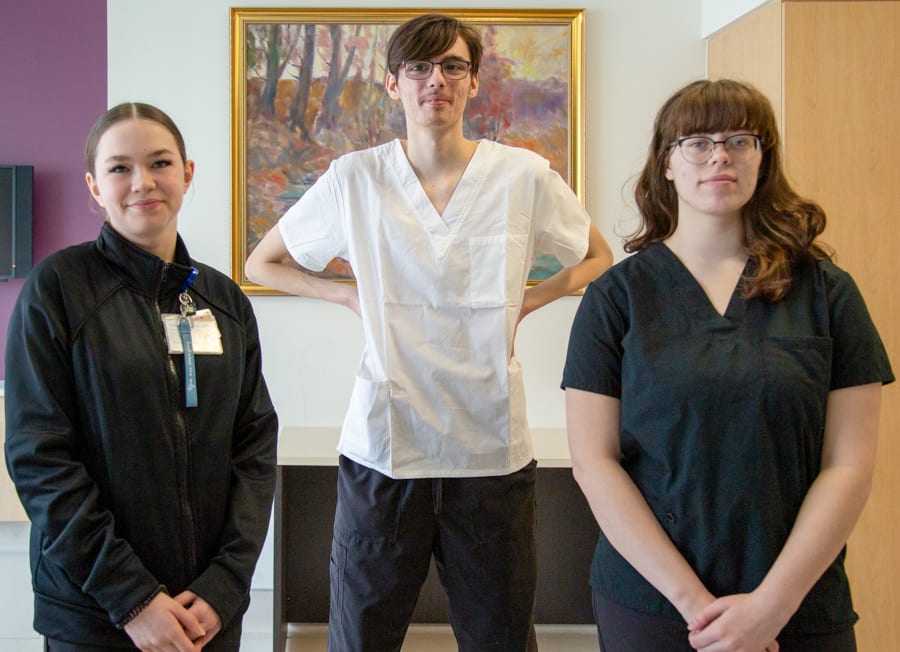We are Niagara Health is a series of stories that celebrates the incredible people working and volunteering in our organization and how they make a difference in the lives of patients and coworkers every day.

From left: Desiree Arsenault, Damien Hicks and Alexis Vernon are Project SEARCH interns at Niagara Health, where they are getting hands-on work experience to prepare them for their careers.
Alexis Vernon has worked a few jobs already in her young life, but nothing has given her the experience that her current role at Niagara Health has.
Since January, Vernon has been making a name for herself in the Dietary Services department, trying her hand at everything from tray passing, delivering meals to patients, to working in the dish room at the Marotta Family Hospital in St. Catharines and assembling meals.
Vernon is one of three students, from École secondaire catholique Saint-Jean-de-Brebeuf in Welland, working at Niagara Health until June. They are participants in Project SEARCH, a hands-on work experience program that prepares young people living with developmental and general learning challenges for the labour market when they graduate.
Vernon is joined by Desiree Arsenault and Damien Hicks, who are gaining experience in Dietary Services and/or Environmental Services (EVS).
“I already had a lot of work experience before, but this is to refine that so I’m able to have more adult jobs, not the little jobs that I had in high school,” Vernon says. “This is the next step, so I can take on a job and say, ‘Give me more responsibility.’ This is so I can make good money and be a functioning person in society.”
The trio are part of the first Project SEARCH program to launch in Niagara, and the first French cohort in the world. By immersing graduating or newly graduated high school students in in-demand labour roles with leading community organizations, like Niagara Health, the program serves as a transformative opportunity that helps participants develop confidence, character and a sense of purpose.
“Your disability doesn’t define you. It’s not your whole story. It’s just a chapter.”
“All three of them are building their resumes and learning skills to do that,” says Julie Roy, the students’ resource teacher. Roy spends time with them each day doing class work, including role playing scenarios that may happen on the job and helping the students journal about any challenges and positive experiences they have during their daily four-hour shifts at the hospital.
Hicks, who did an internship in Dietary Services and recently started in EVS, is becoming a master at managing his time. It’s an important employability skill he honed working in the dish room, doing quality control of dishes after they’re washed, and helping to package bread, lunches, and other food going to other Niagara Health sites.
In addition, he and his Project SEARCH program mates have also learned the importance of attendance, following and sticking to a schedule, communication skills, and holding themselves accountable.
“I’m pushing myself more,” Hicks says. “I’ve learned quite a bit of time management. I’m learning to be a bit more independent, though that takes a lot of time. It’s essential things to know for when I get a job – things a person can miss out on when they’re growing up, based on what we’ve been told.”
Trained graduates of the Project SEARCH program may be hired by their host organization when their placement ends or be supported by an employment agency partner, in this case March of Dimes, to connect with other community employers.
Whatever happens come June when their internships finish, the experience has been life-changing for Arsenault, and not just professionally.
Some of the greatest growth has happened personally. Arsenault, who experiences anxiety, takes three buses from Niagara Falls to the hospital in St. Catharines every day, where she has worked with EVS cleaning the cafeteria, dry-mopping, refiling mask and hand sanitizer dispensers, stocking supply closets, doing laundry for lab staff, and most recently, helping to keep Diagnostic Imaging suites in tip-top shape for patients and staff.
Arsenault has to leave home at 6:30 a.m. to make her shift. There was a time when she couldn’t have imagined travelling alone on public transit, and especially two hours each way to and from the hospital.
Now, it’s all in a day’s work. So is being part of a team of colleagues. Arsenault says a year ago she wouldn’t have been able to work with so many coworkers because of the anxiety she can feel being around other people.
However, her faith in herself has grown so much with Project SEARCH, she says. She measures it, in part, by the number of keys she has been given to access closets for supplies and areas she needs to clean. Now she looks forward to hitting her next milestone.
“This is the next step in trust. They know I’m a good worker and get stuff done first. It’s a push toward responsibility, and my next step is to get my own (cleaning) cart,” Arsenault says. “I’m a changed woman. I’m more confident in what I’m doing.”
The trio of students aren’t the only ones changing. Project SEARCH also creates disability confidence in recruitment and retention, and builds a truly inclusive workforce culture. Vernon, Hicks and Arsenault have sensed the impact they have on their coworkers, too.
Some comment about how Project SEARCH could help their own family members. For others, it’s a reminder about neurodiversity and how everyone, no matter how they learn, thrives with kindness, patience and compassion.
“Your disability doesn’t define you,” Arsenault says. “It’s not your whole story. It’s just a chapter.”
“Continue being kind,” Hicks offers. “Don’t be overwhelming.”
And continue to be aware of – and appreciate – people’s differences, Vernon says. “I definitely feel I’ve had an impact on everyone here because of the positive words they’ve said to me that I’m doing a good job.”

